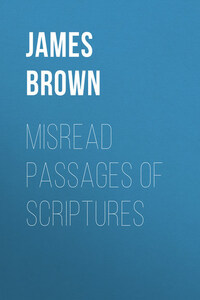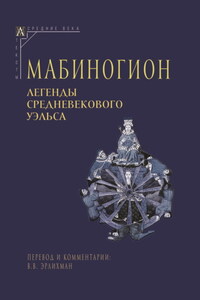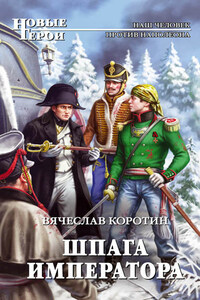The accompanying Sermons on "Misread Passages of Scripture" form part of a series which the author projected, but which through ill health he has been unable to complete. He sends them forth in this imperfect form, in compliance with the wish of the publishers; and in the belief too that the topics of some of them will not be without interest, in the conflict of thought on theological subjects which waxes rather than wanes year by year.
The reader will see that much space has not been occupied with critical discussions; nor has the author gone out of his way to correct the English version of the Scriptures. He appreciates fully the value of critical inquiries; but it is wonderful how the sense of leading passages of the Bible gets moulded, apart from, and even in defiance of, critical considerations, by the bias of the various theological schools. Each school makes, if not its own version of the Bible, its own interpretation of the leading passages; and tradition plays an important part in the Protestant as well as in the Roman Church. The text being accepted, each party makes its own version of it, and widely different senses are extracted from the same words. Hence it happens that important passages of Scripture have certain ideas associated with them in the popular mind, which, if they are erroneous, are not to be corrected by a simple announcement, on competent critical authority, of the true rendering of the text.
The author of this little volume believes that there are some very popular but very detrimental misapprehensions, not of the true reading only, but of the true bearing of many important passages; and he offers this slight contribution towards a true understanding of them in the earnest hope that it may stimulate some so to search the Scriptures as to find in them not the confirmation of cherished dogmas, far less stones for the slings of theological war, but the Word of Eternal Life.
Clapham,
New Year's Day, 1869.
"My kingdom is not of this world." – John xviii. 36.
Perhaps there is no passage of Scripture more constantly misunderstood than these simple words; and certainly there is no misunderstanding of Scripture which has exercised a more detrimental influence on the life and development of the church. The whole passage contains the very marrow of the doctrine of Christ concerning His kingdom. It is the basis of its constitution. To this, its subjects have rightly looked in all ages for instruction as to its fundamental spirit, principles, and aims. Words more solemn, more pregnant, were never spoken in this world, in this universe, than these. They were spoken at the very crisis of universal destinies. They form the dividing line between the two eternities. From eternity all things had been working towards that hour – the consummation of the incarnation; and to eternity the influence of that hour would go forth, remoulding, regenerating all the worlds. Beyond any words that have ever been spoken, these words are worthy of intense and reverent attention. They are the words with which the Son of God passed on to the cross, that He might pass up to the throne.
The two kings stood there in presence. The representative of the king of this world, who wielded all its force and guided all its movements, the man who had but to nod and the whole civilized world trembled and obeyed; and a King, the elements of whose kingship few could discern, who wielded a strange power and produced a deep impression that He had a right to rule over men, but who wore no signs of royalty and laid no claim to the possession of this world's thrones. Nay, a kingdom had been forced on Him, and He escaped as from a deadly danger from the homage of His subjects, while He spake to them such searching spiritual words that they conceived a great dread of His kingly commands and claims. He bade them begin to rule themselves when they were dreaming of a splendid rule over the gentiles; and He turned inwards on the inner obliquity, foulness, and deformity, those eyes which were watching eagerly for the signs of an approaching advent of a glorious, celestial imperator to the world. Jesus looked on Pilate's kingship, and fathomed it perfectly. He knew from whence the power sprang, and by what springs it was fed, which seated Pilate's master on the world's imperial throne. Pilate found the royalty of Jesus unfathomable; none of his worldly experiences helped him to understand it. Art Thou a king then, poor, worn, tear-stained Outcast, forsaken of every subject, of every friend, in the hour of Thy bitter need? And yet the nascent smile of scorn was checked by something which cast a spell even on that worn-out profligate's heart. That lonely wasted Man there had that about Him which made the representative of the world's master afraid. It seemed mere idle talk to a man like Pilate: "a kingdom not of this world;" "witnessing to truth;" "disciples of the truth: " it was all childish to the trained intellect of this experienced ruler; and yet there seemed to be some power beyond the grasp of his intellect, which something within him recognised, and which might create and rule a kingdom after a fashion which till then had never even crossed his dreams. But to him the mystery remained insoluble. He wrote a title to which his instinct gave a reality that his intellect denied, "Jesus of Nazareth, King of the Jews." And here in this passage we have the Lord's own declaration of the constitution and aims of His kingdom; the kingdom which, from that hour, has been the ruling element in the history of this world, and, as we learn from the Apocalypse, of all the worlds of the great universe of God. And men persistently misread it as they misread Him, and employ His words as they employed His works, to frustrate the purpose for which He entered into the world.








